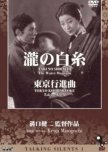
This review may contain spoilers
"It all comes down to chance"
“The river flows on, it always has, it always will.” Director Mizoguchi sent his lovers down the river to the waiting waterfall at the end in this tragic tale. He comes across as an early feminist showing his independent heroine go through many trials all at the hands of men, her every compassionate deed coming back to haunt her. Yet she never gave up or gave in even when there was little left to lose. He seemed to want to shine a light on the fact that women had little say in their lives, they could be abused, sold, and even betrayed by the male judicial system as well.Mizushima Tomo aka Taki No Shiraito performed a mesmerizing water show with a band of traveling entertainers. Known for her beauty she was also twenty-four-years old, an old maid at this time. Fate sent a carriage driver into her path. When a rickshaw passed the horse drawn carriage he drove on the road, the passengers in the carriage demanded he pass the rickshaw. In the process an axle was broken so he carried Tomo on his horse to the next town. She was instantly smitten but feared she’d never see him again. Once more fate intervened, and she found him sleeping on a bridge in the moonlight where she was walking one night. She learned his name was Murakoshi Kinaya. He’d been fired for driving the horses recklessly. His parents had died causing him to leave school in order to earn a living and now he was unemployed. Tomo told him she would help pay for him to finish law school so that he could become a great man. “As long as I breathe, I’ll remember my debt to you,” Kinaya promised.
Going into a Mizoguchi film I know better than to expect a happy ending and he did not fail that expectation. Tomo writes Kinaya letters inclosing cash for his tuition. Kinaya uses her dedication to spur on his studies and desire to succeed. During the winter, the show would have to close down and money became tight. Tomo always found a way to send Kinaya some money. Along the way, she helped two couples suffering at the hands of Minami the knife thrower and Iwabuchi the loan shark. Her generosity emptied her pockets and she had only one other means of earning the money for Kinaya to finish school and it led to the awaited tragedy. Let’s just say there is no leniency for a woman defending herself.
Kinaya and Tomo meet once again, both prepared to die. Tomo finds genuine joy in Kinaya’s success and is complete. Kinaya acknowledges he would still be a laborer if not for her sacrifices. And the water flows on, along with their short and ill-fated love.
The copy I watched of this film was very badly damaged. This was a silent film per se, but also had music and a benshi narration. I found the voiceover to be distracting and ended up muting it to focus on the performances. Even with the fading and scratches, Tomo’s water show was magnificent and a bit of a mystery as well. Irie Takako was beautiful and gave a moving performance as the compassionate woman who just wanted to be loved. Whether showing Tomo performing her water tricks, falling in love, helping those who needed it, or fighting for her life, Irie made Tomo believable and a worthy, if flawed, heroine.
Mizoguchi wasted no chance to show that it was the men in the story who created the problems for Tomo from the knife thrower to the judges. There’s an old saying, “No good deed goes unpunished,” and for Tomo this was true. Despite all she suffered for the ones she loved, she remained resolute to the end, cleansed as if from flowing water, until all that was left was joy and satisfaction.
11/21/22
Was this review helpful to you?

Scorching Sun, Fierce Winds, and Wild Fire
1 people found this review helpful
This review may contain spoilers
A Violet by any other name would still be as fierce!
Scorching Sun, Fierce Wind, Wild Fire boasted an all-star kung fu cast---Angela Mao, Chang Yi, Lo Lieh, Dorian “Flash Legs” Tan, and Roc Tien Peng. Despite a huge cast, most of them familiar Taiwanese film fighters, this made in Taiwan flick fell apart due to haphazard writing. Only an unlikely bromance saved this movie.You would never know this was set during the Chinese Republican Era by looking at it. The costumes for the most part could have been from almost any era used in kung fu movies. Guns were introduced at one point by government officials which brought it into the Republican era. A possibly 1960’s car in one scene took the audience too far forward in time!
This should have featured Angela Mao since she was Violet, the mysterious rebel leader always dressed in….violet…and with her face covered. Sadly, she was only able to shine in the final grand fights. Roc as a rebel leader from the south was rather lackluster in his scenes. Chang Yi is always a good baddie and he didn’t disappoint as Wu Chi, the traitorous head henchman for the local warlord. The best part of the movie for me, were Lo Lieh and Dorian Tan as two escaped prisoners. They formed a reluctant bromance that was both humorous and the most sincere relationship on the screen. I truly enjoyed their interactions and fights. Fights against each other and fights against the baddies.
The story revolved around the rebels and a missing treasure map. Roc had half of the map and the warlord had the other half. 100,000 bars of gold were the prize for whoever could gain both pieces. Honestly, that flimsy story was the excuse for people to fight from beginning to end. Some fights were better than others. Chang Yi was featured in a great many of them. Aside from a fight with Lo Lieh and Dorian against some bandits and officials only the final 20 minutes of fights were worthwhile. Dorian’s legs did most of the heavy lifting, kicking in the fights. Angela finally had some face time on screen during the final fights showing her fierceness. I should mention that the nefarious Wu had a poisoned knife that melted people-quite gruesome.
I have to mention that some of the music sounded like it was lifted from the original Star Wars movie. You never know what you will hear in an old kung fu film!
If you like the cast and Taiwanese kung fu films from the late ‘70s this is one to try out. Don’t expect to see too much of Angela, lower your expectations, and hi-yah!
11/18/22
Was this review helpful to you?

This review may contain spoilers
"Cover your belly button!"
Raiga: The Monster from the Deep was the second in the Raiga trilogy and arguably the best of the three. The actors weren't better, nor the sets, but the monster scenes were much improved.The whole Raiga trilogy was low budget, super sale bargain bin quality. Despite its lack of finesse, story cohesion, and quality CGI, it was apparent how much the director loved this Kaiju. If you've ever seen the third one it leaves no doubt his determination to tell Raiga's story, however convoluted it was.
This Raiga had evolved to be able to walk on land, much to Asakusa's disappointment. The city was torn up not once, but twice in this movie.
The human story revolved around a widower and his three teenage daughters. He had two buddies and all were on the festival committee which is very important to remember when a monster is bent on destroying the town. This widower who hawked T-shirts was interested in a young woman and tried to hide it from his children who were all too aware of his feelings. Commander Kito, he of the eye-patch and deranged personality, led the defense forces. Between his efforts and Raiga's not much was left of Asakusa. All of the acting was over the top with unending mugging for the camera. How well you can stomach this kind of comedy may determine your enjoyment of this movie. For me, it didn't work.
The Bone Fish/Fish Born of the Devil/Dragon Killers made an appearance again, attacking people on boats and land. Raiga battled a sea monster in the opening scenes and later another Raiga. The lightning bolts and fire breath were more spectacular than in the first movie. Aside from the monsters, the rest of the CGI and miniatures were low quality, especially for 2009. The director made liberal use of red and green lights for both human and monster scenes.
Though I would never question the director's passion for Raiga, I might question his abilities for putting a seamless, coherent story together and understanding the film's identity. Was it a parody? Most probably. Was it a comedy? Your mileage/kilometerage may vary. Was it a horror? If you are super sensitive to bone fish tearing people's throats out-then maybe. Was it a Tokusatsu? Yes. An obvious rip-off of Godzilla, at least the Kaiju scenes, for the budget, were not bad.
The synopsis says the movie has something to do with global warming. There actually were a couple of lines wedged into the ending to propose that idea, very ham handedly. This movie was all over the place and hard to take seriously even for the genre. After the final battle much of the city had been destroyed but the main characters were shown laughing and frolicking on a hillside. That weird juxtaposition had me wanting Raiga to come back and mark his territory again right where they were, though I'm not sure they would be deserving of the rainbow.
If you are wanting to try the Raiga movies, this is the one to start with. It shows the best of the clips from the first Raiga and how much the monster development had improved. The third film was more of a fan service and only for the most devoted of Kaiju fans, actually, you'd really have to love Kaiju to attempt to watch this movie. It could almost be put into the it's so bad it's good category...almost.
11/13/22
Was this review helpful to you?
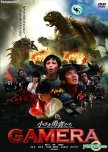
This review may contain spoilers
Gamera-The Friend of All Children
In Gamera's final film, he returns in a new form. Much like Mothra's job of protecting the environment was handed down to her children when she passed on, Gamera's progeny had to take on the mantel of protector in this film. As were the Showa era films, Gamera the Brave was aimed at children with a solid dose of green and purple blood for slightly older children.After sacrificing himself in 1973 to rid the world of the Gyaos the big turtle leaves a Kaiju hole in the world, with no one to look out for Japan. That is, until a young boy, Koru, finds a turtle egg and a red glowing turtle shell. There are lots of cute scenes with the boy and his friends getting to know the flying baby turtle. His mother had died recently and the little turtle begins to open his heart. He names the turtle Toto after the nickname his mother had given him. Nothing stays quiet for long and soon Zedus a man-eating Kaiju with Dilophosaurus like frill comes stomping into town eating people and tearing up the property. Baby Gamera aka Toto instantly grows much larger but well below his fighting weight. He does manage to drive the troublemaker out of town but not before he's badly wounded. The government takes him to a secure location hoping they can make him grow larger to be able to combat the new threat.
As the boys search for Toto, their friend Mai, who had surgery and was given Toto's glowing shell for luck tells the boys that Toto needs the red glowing good luck charm. He needs that luck all too soon as Zedus shows up again looking for Baby Gamera. This scenario starts out tortoise slow, but eventually gains momentum and ends with a relay of small children running the glowing object against the escaping crowd toward the danger in order to try and save their turtle hero.
Gamera the Brave combined guys in rubber suits with competent special effects. The monsters fighting amongst the buildings and perspective were quite good. The fights were done well as each opponent revealed new abilities and upped the ante. Toto's face was cute and expressive which people either seem to love or hate. I thought for a reboot it made sense because he was being portrayed as a juvenile. By the end he was growing into the Gamera he was intended to become.
Though aimed at children, Zedus' bloody teeth and chomping let you know he'd eaten people for lunch. Gamera was also impaled by Zedus' purple tongue at one point. Other than the Kaiju blood spurting, the rest was kiddie friendly. For those who are sensitive to it, there was alcohol served in his dad's café.
The children were all likeable though Tora pushed the envelope of annoying near the end. The children's relay to help Baby Gamera was sweet and surprisingly heartwarming.
This is clearly a movie for children and one for Gamera fans. Unless you fall into either category you may find it difficult to sit through. For Gamera fans it's a bittersweet farewell to the giant turtle. It's also my last Gamera film to watch having saved his swan song for the final one. This would have made a nice reboot for the gentle giant who loves children, but thus far it has not been meant to be. For now it's goodbye Gamera, The Friend of All Children.
10/28/22
Was this review helpful to you?
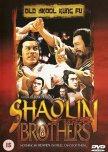
This review may contain spoilers
Two words-Hopping Vampires!
From the moment I saw the dark forest shots and familiar waterfall I knew this Hong Kong movie was filmed in Taiwan. I immediately lowered my expectations. Good thing because the story was almost incomprehensible.My hopes were heightened when the movie began with a line of hopping vampires, hopping through town guided by a Taosist priest. Those hopes came crashing down pretty quickly.
The gist of the plot is Ming rebels trying to survive against their new Ching overlords. Two of the main players David Tang Wei and Carter Wong had studied with the same master and now ten years later were on opposite sides. As he often did in later movies, Carter played the baddie. David’s sister Fan Ling also joined in the fighting. Tung Li was a Ming General working as a rebel, too.
Carter had stolen the masters poisonous needles and the rebels had a secret list. Now that the basics are out of the way, it was time to get down to some fighting. David was poisoned by the secret needles and the rebels sought to send the secret plans via “hopping vampires” as the area was crawling with Chings.
The movie muddled around for a bit with the “hopping vampires” being taken through town and getting into fights. Finally the Ming General and the brother and sister rebels took on Carter and the blood started flowing.
The body count was high, but due to the poor storytelling and often dark scenes I wasn’t emotionally attached to any of the characters.
The initial fights were mostly hack and slack sword fighting. In the grand finale fights we finally got some hand to hand combat. You don’t have Carter Wong in the movie if there wasn’t going to be some kung fu. There was a lot of wire-fu, especially for Fan, but most of it was tolerable.
Joseph Kuo made sure there were some interesting shots but the story was haphazardly put together. The fights weren’t interesting enough either to hold my attention. Only for hard core fans.
10/25/22
Was this review helpful to you?
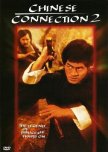
This review may contain spoilers
I'm trouble!
Chinese Connection 2 aka Fist of Fury II is a sequel to Bruce Lee's 1972 Fist of Fury. Not to be confused with Jackie Chan's New Fist of Fury that had some of the original cast in it. The only returning cast member in this film is Tien Feng.It takes place right after---50 YEAR OLD SPOILER ALERT---Chen Zhen's execution in the original.
After Chen Zhen's death, the ruling Japanese fear the kung fu schools will band together and oppose the foreigners. Even though the Japanese leader was killed in the first one, power hates a vacuum and Lo Lieh's Miyamoto takes over and continues to terrorize the locals. Tien Feng had become the ad hoc leader of the Ching Wu school and Hsieh Han was the leader of the other big school in town. Neither had any luck with the Japanese, with the Ching Wu school being closed down. In comes Bruce Li/Ho Tsung Tao as Zhen's brother Shan. He's disgusted that the local schools haven't fought back and is determined to not only avenge his brother's death but restore the honor of Shanghai. Yeah, good luck with that fella. No matter how few or how many Japanese fighters showed up the kung fu heroes ended up with their butts handed to them. They must have all had their beginner belts because the Japanese dojo janitor could have beaten them.
Shan faces opposition not only from the Japanese overlords also including Miyamoto's right hand man played by Luk Chuen/Shikamura Yasuhiro but also the local Chinese kung fu students. Every time Shan puts a beat down on the Japanese thugs, the students end up paying the price and their numbers were dwindling because of it. They didn't care whether they handed him over to Miyamoto or ran him out of town. Ultimately, it was a kung fu movie after all, Shan and Miyamoto face off in the grand finale.
As far as a Bruceploitation movie goes, it wasn't bad and didn't lean too heavily on trying to duplicate him as some did. Bruce Li did bear an uncanny resemblance to him and was a decent fighter, but not near the level of the legendary Bruce Lee. And making him the brother helped to put some distance between the two. In the last fight they did have his face scratched like in Enter the Dragon. Lo Lieh also made a move with red hands like he did in his hit film King Boxer.
The fighters were pretty good, though there was way too much wire-fu and flipping around for my taste. Bruce Lee never had to rely on those gimmicks. The fights weren't too slow, some were better than others. There was a nunchuck scene that should have been omitted as it was clunky and seemed out of place. I really enjoyed the finally fight. The two actors were fully engaged and remembered to act as well as fight. The cast was strong, aside from the actors already mentioned there were many familiar supporting and bit players in it, many of whom were hired for their stunt and fighting abilities.
Overall, it was a well made kung fu film for the time, though it did tend to run in circles. It was actually a coherent sequel and respectful to the original. Again, I grade these 1970's niche movies on a curve, they had small budgets and a specific audience. Like other movies about Chen Zhen, such as Legend of the Fist, the lasting legacy of Bruce Lee and his movies live on. While there was an attempt to capitalize on his heightened popularity I'm sure, they were still able to come away with a kung fu movie that made a little sense, something we don't always see in this genre.
9/27/22
Was this review helpful to you?
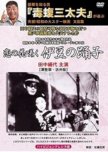
This review may contain spoilers
"I am a wandering bird in tears"
In a chaotic world with war and a financial depression The Dancing Girl of Izu ponders whether love or stability is more important. A happy heart or a full belly? Safe shelter or life on the road?College student Mizahara helped out a band of traveling performers and became friends with the head of the group, Eikichi. As he traveled with them, he fell in love with Eikichi's sister, Kaoru. Eikichi had inherited a gold mine but squandered his money and sold it to Zenbei, a friend of his late father. Now he and his wife and sister are forced to earn money as itinerant entertainers.
A disreputable engineer who had worked with Eikichi, tried to shake down Zenbei for a reward for showing him the vulnerable mine years ago. Zenbei gave him some change and kicked him out. The engineer went to Eikichi telling him that Zenbei had taken advantage of him when he bought the mine so cheaply and motivated Eikichi to ask for more money from the mine owner. Zenbei refused to give Eikichi money outright but offered money to buy his sister. Eikichi, who was furious at losing his reputation along with his money had no problem with throwing his sister to the wolves.
Mizuhara intervened by confronting Zenbei who also happened to be the father of his best friend. At this point, in the movie we find out that all is not as it seems. Mizuhara realized this as well and also realized that Kaoru's best chance for "happiness" was not with him.
Zenbei and Mizuhara made choices for Kaoru, as did her brother. Regardless of their motivations, Kaoru was left without choices, her future in the hands of the men around her, some she didn't even know.
Director Gosho used the beautiful Izu Peninsula to good effect with the mountains and streams often in the background. The character development seemed to come second to the melodramatic plot, leaving me disconnected from their trials. It was hard to see a strong love developing from the short scenes the lovers had. Their feelings came across as more of a holiday crush. Probably best one of them was thinking pragmatically.
This silent film had no music and I'm unaware if it ever did. The film was originally intended to be a talkie but ran short of money. The copy I watched was faded with salt and pepper pocking but it didn't take away from my viewing experience. I was more curious if the sides had been cropped as there were times people's faces were cut off which looked more haphazard than artistic.
The acting bordered on overacting at times as happened with some of these older films but overall they did a good job. I usually enjoy Tanaka Kinuyo's performances and it was interesting watching her in one of her earlier movies. She was required to cry often which could wear thin after the third or fourth crying jag. The tears were understandable as her character was not consulted on her future, but as I said, it started to feel like overkill even for a supposedly very young girl experiencing love and heartache for the first time.
The start-up was misleading with a missing "geisha" which had little to do with the plot, but once it got past that red herring, the story started to gain traction. If you enjoy silent films this is an emotional one of young love to try.
"I am a floating weed
I spend my youth in traveling
In every waking moment
flowers of love and sympathy bloom"
9/17/22
Was this review helpful to you?

This review may contain spoilers
"If you don't change it yourself, one day it'll change you"
The only things special about Special ID were Donnie Yen and the bone crunching fights. The story retread most of the gangster clichés and struggled to be consistent.Donnie Yen played Chen Zi Long, a deep undercover police officer. He's ready to go back to active duty but as always he's required to do one more job. He's trying to bring down Boss Xiong (Ngai Sing) but along comes his old buddy Sunny (Andy On) who has acquired his own gang and gone bonkers evil. Then much to his chagrin he's partnered with a mainland cop, Fang Jing (Jing Tian). Throw in a super tight relationship with his mom that takes up a lot of air time and Chen is afraid that he is close to having his cover blown which would put his mama in danger.
Special ID started out as a gritty gangland drama but then seemed to lose focus. The relationship between Chen and Fang seemed especially confusing as it went back and forth trying to decide if it was going to be a buddy cop adventure or a romance or antagonistic work friends. Without explanation, a lot of time was invested in Chen's relationship with his mother. The movie had a real identity crisis that never quite resolved itself. Thankfully, plot is not the priority in a movie like this. Donnie went all out for his fight choreography. His fight with Ken Lo was brutal and showed that Ken still has it, watch for him to go into the splits! As often happens, one fight multiplied and the next thing you know Donnie was fighting a knife wielding gang. His final fight with Andy mixed in some MMA grappling along with his martial arts, mostly it was a vicious no holds barred fight to the death. Bruce Law's car chase choreography was brilliant. While Fang Jing seemed out of place at times, the car chase with her and Sunny wrestling inside and outside a Land Rover at full speed was death defying and amazingly shot.
Donnie did an excellent job as the battle weary undercover cop, even when his character was passively dragged from one place to the next. Andy's Sunny wasn't very well drawn but he made for a serviceable Baddie. Jing Tian seemed far too slight to be the badass she was supposed to play, but made the most of the female sidekick role with all it's cringey dialogue. It was good to see old timer Ken Lo showing off some of his Muy Thai and Taekwondo moves early in the movie.
As I stated, there wasn't anything creative or consistent about the story but that's not usually the draw to a Donnie Yen movie anyway. The fights were deliciously creative and consistently good showing that Donnie is a master at what he does best. I just wish the story had been stronger so that I could have rated this higher.
9/4/22
Was this review helpful to you?
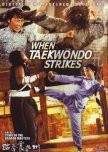
This review may contain spoilers
Angela Mao showed why she was one of the best when she fearlessly took on Sammo Hung and Hapkido Grandmaster Hwang In Shik without flinching in this action packed film. The story might have been short on plot but it was long on fight scenes and Angela is always a delight to watch fight.When Taekwondo Strikes was set mostly in Korea around 1930 during the Japanese occupation. Jhoon Rhee (the Father of Taekwondo in America!) in his only lead acting role played the leader of the resistance. Hong Kong actor Carter Wong was the naïve, young pupil and follower. And Taiwanese actress Angela Mao was a transplanted Chinese woman living in Korea with her mother. To round out the international cast, Ann Winton, Rhee's real life American student also played a member of the resistance. Throw in Sammo Hung and Hwang In Shik as Japanese fighters and it was one exciting martial arts party!
Lee Chung Tung (Rhee) and Jin Zheng Zhi (Wong) were accosted by the Japanese in a Catholic church headed by an American priest. Jin had fled there thinking the Japanese wouldn't cause trouble in the foreigner's house of worship. He was wrong. The first of three fights took place there. Wan Ling Ching (Mao) had a marvelous fight in the church when she went looking for the priest after he was captured and a Japanese bad guy accosted her. Big mistake. She and Lee teamed up determined to get a Secret List out of Korea into Manchuria. Nothing ever goes easy in a martial arts movie and eventually there was a big thrown down in Manchuria over ownership of the Secret List.
The story was thin, but the fighting was magnificent. With Hapkido and Taekwondo being highlighted the high flying kicks kept rapidly being thrown. Angela's iconic fight in a restaurant against Sammo and his men is legendary. Jhoon Rhee and Hwang In Shik lent realism and credibility with their expert kicks. Some of Sammo's choreography could venture into what I call kung fu posing where arm movements are unrealistically held too long. The kicks tended to be faster and more creative. And in a fight in the church Angela used objects around her to create an epic beatdown on her Japanese opponent.
Due to a common history of Japanese occupation, this 1974 movie was very anti-Japanese. If you are sensitive to that you might want to avoid it.
The sets could be laughably bad. The same Korean downtown was used for Manchuria as well. There were a few more realistic settings but most were made to be breakaway so that people could be thrown through windows and walls.
Fun fact: Andre Morgan who played the beleaguered priest was an American who ultimately became CEO of Golden Harvest. He helped produce Bruce Lee's Enter the Dragon as well as producing this film.
When Taekwondo Strikes was a fun film to watch. Jhoon Rhee made a properly badass resistance leader. Angela Mao is one of my favorites and I could watch her glare her opponents into submission any day. She always seemed believable when taking on baddies and this movie was no exception. If you aren't looking for a complex plot and simply want to watch some of the best fighting each other this is a good movie to try.
7/30/22
Was this review helpful to you?

This review may contain spoilers
When heaven and Earth are opposed, the result is destruction
Gamera: The Revenge of Iris is a good old fashioned monster mash with real stakes and believable monsters. I realize the ridiculousness of that statement when talking about a giant tusked turtle. This film is easily the best of the Gamera films I've watched. No annoying 8-year-old, just amazing Kaiju and realistic fights and consequences.The story was complex and at times convoluted. G3 brought back a few characters from the first two of this trilogy, added some teens, a scientist, a priestess, a nihilistic dude, and the requisite small minded bureaucrats and military. Because of the collateral damage caused by Gamera in the beginning of this film and the two previous films, the government has determined he's simply too destructive to let live. Bad timing as the Gyaoses have started popping up all over the world. Even worse a nemesis in a cave is about to hatch and feed on a teenage girl's hatred of Gamera and need for revenge. She names the nemesis Iris after her dearly departed cat. Gamera save us from a vengeful teenage girl!
There is a lot of mumbo-jumbo about Gamera being created to hold Mana, the life energy of the earth and his nemesis being the opposite, a real destroyer. I appreciate the writer's desire to give us some meaning behind the monsters, but honestly, I never did quite grasp all of the talk about their version of The Force. Philosophically, the movie touched on things like is the enemy of my enemy really my friend or a necessary evil? Is Gamera a good guy if his protection costs tens of thousands to lose their lives? And does the cost seem acceptable as long as it's not your loved ones and home destroyed?
More than almost any Kaiju movie since Godzilla 1954 the humans were truly important and integral to the story, in fact the nemesis Iris, would not have been as threatening without Ayana the teenage girl's hatred to feed upon. The acting while not award worthy was enough to draw you into the story and give emotional heft to the actions being played across the screen.
Iris was a lovely, menacing terror to behold, it would make almost any Kaiju envious at the care taken in creating it. Gamera, well, Gamera will always be a giant turtle with tusks that can shoot flames. The fights were immediate, brutal, and up close. The scenes of the humans trapped in a giant building as the two went mano y tentacles was spectacular. The perspective and size of the monsters with the tiny humans below gave real suspense to the scenes. No cardboard buildings destroyed in this film, there was a lot of detail in the buildings crushed during the giants' fights. There were problems with a few scenes during the fights but overall the CGI and miniature work were excellent especially for a pre-2000 movie.
Gamera 3 gave us more compelling humans and stories while not sacrificing what people came to see: visually stunning monster spectacles across the cities and skies. Unlike earlier Gamera movies this one was dark and aimed more at adults. Even with the darker mood, G3 was a fun fast paced ride
7/21/22
Was this review helpful to you?

This review may contain spoilers
If you don't toe the line, they will crush you
The Serpent aka Orochi is a morality tale that follows a samurai whose sense of honor and lack of forethought land him in deeper and deeper quagmires. A silent movie with Kabuki style makeup and a benshi performance, a narrator who describes the action throughout, The Serpent is a very early silent movie with excellent fight choreography and cinematography. The moviegoer is reminded repeatedly that "not all who are respected are worthy of the name" and "not all who wear the name villain are evil men".Kuritomi Heizaburo was a samurai from a poor background. At a birthday party for his master an aristocrat's son taunts him and throws sake in Kuritomi's face which causes a fight to erupt. Everyone takes the wealthy samurai's side and Kuritomi is suspended for a month. When he stands up for the honor of the master's daughter against three gossiping traveling samurai he is kicked out of not only his master's house but also the town and labeled a bully. A masterless Ronin, in threadbare clothes, Kuritomi rails inside at the injustices visited upon him. The master's daughter he loved, Namie, easily believed evil of him as well as the rest of the samurai and townspeople. After more injustices caused by his place in society and his hot headedness Kuritomi spends time in jail and runs afoul of the law. He falls for another woman, Ochio, who will have nothing to with him because of his bad reputation as an outlaw. All l he wants is for someone to see into his heart and know that he is a good man. Finally, thinking he has found a noble and wise master he learns that the nobility is all a façade and the man is vile to his core.
Time after time in the movie, those who are revered for their place in society turn out to be filled with filth. Kuritomi who starts out with a pure heart is never seen for who he really is and suffers mightily for it, slowly circling down a lawless path. The Serpent is critical of societal structure with wealthy people and those of a higher social stature being able to bend justice to meet their needs while people like Kuritomi cannot find justice for justice has deaf ears where he is concerned. It is also a critique on judging a book by its cover, never looking to see what is behind the mask people wear. Kuritomi was called a blood thirsty devil though he had never killed anyone. He was a desolate, desperate man who only wanted justice and for someone to see that he was a good man.
For a 1925 film, the cinematography was exceptional, with wide pan shots and close-ups as were needed. The filming of the fight sequences were quite creative. If I have one qualm it's that the fight scenes and running scenes were sped up ala Keystone Cops. The fight choreography was so unprecedented for an early film that I wish they had run it at normal speed so that I could have fully enjoyed the intricate moves and falls.
The version I watched had music in the background. I had to mute it for most of the movie because the narration took place in Japanese and Russian overlapping, very distracting. The acting was primitive and not as natural as in some other later silent films.
Kuritomi, as honorable as he saw himself, was flawed. He did not think situations through or weigh consequences. Even though the world showed him over and over it was not a fair place he refused to believe it and ran head long into situations without thinking them through. Where Namie and Ochio were concerned, Kuritomi could be obsessive and overly aggressive, there was a reason they feared him. Yet for all his flaws he was a pitiful character, only wanting to do the honorable thing and always punished for it, no one to trust, no one to care for him. Serpent can be a challenging movie to watch at times when the lead behaves unsympathetically and as unhappiness upon unhappiness is dumped upon him.
If you are open to exploring old movies, and as an example of an early samurai film where the samurai are not shown in a favorable light and a tale of a man, despite being labeled an outlaw, only wanting to be seen and understood, Serpent is worth trying out.
7/20/22
Was this review helpful to you?

This review may contain spoilers
Money can be earned...but love rarely happens
Set in Dubai, Love or Money was a story of star-crossed lovers. Overly cliched, with the old debate of "love or money" given central stage.Angelica Panganiban and Coco Martin played Angel and Leon, two people who had a disastrous, but memorable one night stand in the Philippines and later met up again in Dubai. Born into poverty with an unmarried, drug addicted mother, Angel raised her siblings and vowed to not make the same mistakes. For her, money would always come before love. Leon wanted to make enough money to help his family and eventually open his own restaurant and live a simple life. The two clashing life philosophies were not enough to keep the two lovers apart who were inexorably drawn to each other. Their greatest obstacle, aside from Angel's fear of being poor, was that she was the mistress of a wealthy, older, abusive man. Connect the dots and you'll understand the formulaic picture.
Angelica was able to convey many of Angel's conflicted feelings. Coco didn't have quite the same acting range. There were several interesting side characters who gave natural performances as Filipinos working overseas to send money home. Enrique, the evil financier, was played and written poorly. The star of the show was Dubai, a beautiful setting that photo bombed many less than enthralling scenes.
Love or Money wasn't a bad movie, it was just weighted down by an overly used formula that didn't have strong enough performances to elevate it.
Was this review helpful to you?
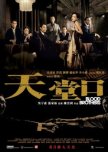
This review may contain spoilers
Blood Brothers went where many Shanghai gangster films have gone before, but they did it with style and a stellar cast.The three blood brothers started out dirt poor in rural China. Two were actual biological brothers, one the ruthlessly ambitious brawn (Kang) and the other, the follower lacking in confidence (Hu). The third blood brother (Fung) would be considered a more thoughtful character who wanted to earn enough money to take care of his mother and marry the girl he cared about. The three traveled to Shanghai and ended up working at the Paradise Club, a front for gangland activity. Kang took to it like a fish to water. Merciless and determined to rise in the ranks, he enjoyed the killing. Hu and Fung struggled with the violence and death.
Shu Qi played the enchanting singer and dancer, Lulu, caught between the deadly gang boss and the man she loved, Chang Chen's assassin, Mark. She toyed a little with Fung, but he was never in serious contention. Mark wanted to free Lulu from the boss by killing the big man but had been unable to do so. Lulu's desire to become an actress overrode her survival instincts causing her to refuse to leave Paradise.
The story started out slow, building steam until the stories converged, ultimately exploding into death and mayhem. Most of the story was predictable which is not always a drawback with this genre. The biggest problem it had was with pacing and editing. Some of the transitions were not seamless and felt like footage connecting the scenes had ended up on the cutting room floor.
Another drawback was that the audience was supposed to shortcut to understanding the depth of the bond between the brothers because we've seen it in so many movies. This created problems as the movie went along and I was left wondering if I should really care about these men.
What Blood Brothers lacked in story, it made up for in sets and costumes. Gorgeous and lush, lovingly shot, Blood Brothers was a very stylish film. Shu Qi and Chang Chen's performances carried much of this film. The brothers could be vaguely interesting, but again, they never reeled me in.
Five Venoms Phillip Kwok was the action director and kept the movie interesting with the action scenes when the story had trouble moving forward. People were killed in a variety of gruesome manners. Because most of them were bad guys, their deaths carried little weight.
Despite the pacing issues and bland performances by the brothers, I never lost interest in the movie and enjoyed it for the most part. Other than dressing itself in beautiful clothes and sets, Blood Brothers did little to set itself apart, but sometimes a familiar story in a pretty package is enough to spend some time with.
Was this review helpful to you?
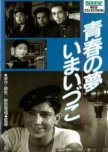
This review may contain spoilers
Four fun loving friends have to learn how to navigate their bonds when they are faced with tragedy, hardship and love. Where Now Are the Dreams of Youth is an entertaining silent film about friendship and what it takes to maintain it through life's challenges.Horino, Saeki, Kumada and Shimazaki were buddies at university with Saeki being the most serious minded as he had his mother he wanted to care for. Horino was the bold leader, always up for a good time. Oshige, the local waitress at a bakery was sweet on Horino even if he didn't seem to return her feelings. Horino was forced to quit school when his dad died suddenly throwing him into a role for which he was not immediately equipped at his father's company. The three other boys finished school and after being turned away from most of the places in town came to their buddy to help them. Cheating just as they did in college, Horino gave them the answers to the entrance exam so that they would be hired. The three hired friends slowly began to distance themselves from brash Horino. Saeki and Horino found themselves on a collision course when Horino decided to date Oshige not knowing she was already involved with Saeki.
This film had some humorous moments in the first half without resorting to slapstick humor which can plague some older silent films. The friends seemed to genuinely care for each other, even Horino who could be obtuse at times. Though the friendship was the focus of the film, the spotlight came down squarely on Horino and his experience as being both the leader and the one left out. The three friends who were hired during the economic crisis were afraid to do anything that might get them fired and began to distance themselves from Horino who was now their boss which left him in the dark and increasingly isolated.
There were also some affectionately playful moments between Horino and his dad, especially when the uncle sent over a modern girl he wanted Horino to date. Takeda Harurô was delightful as Horino's father who, like his son, enjoyed the moment. Egawa Ureo as Horino could come across too strong at times but he could still convey the softer side of his character as well. Though much hinged on the character of Saeki, neither the writing nor the acting was able to fill out the important role. I couldn't find a credit for the actress who played Oshige, though a traditional female role, she did manage to tell Horino truths he needed to hear and the actress played the limited part well. The two other friends were never directly called by their names, and only the heavier set actor was given any lines or scenes with any import.
Where Now Are the Dreams of Youth poignantly portrayed the pitfalls of friendship and the necessity for candor and communication. It also highlighted the problem of maintaining a friendship when there is both economic and social inequality. And finally, especially during a dire economic time, it showed the difference between youthful frivolity and hopeful dreams and the harsh economic reality that awaited the young men outside of school. I found the film entertaining with lessons that carry over to modern times, the lesson that every beloved school friendship must face when the days of school are past, whether they will either thrive or fade in the unknown challenges waiting beyond.
Was this review helpful to you?

This review may contain spoilers
Never go against the family!
Golden Job was a throwback movie with a big budget. It spared no expense on the cast, filming in spectacular scenery, or blowing up or smashing cars and spraying buckets of blood. It also didn't spend very much time on developing a well thought out script. Of course, most people who watch heist and car chase movies aren't usually looking for a lot of depth. If you are, you're out of luck.This "made family" would have benefited from watching a Godfather movie. Never go against the family! Ask Fredo what happens when you do (Godfather II, it's an old movie but worth checking out). Instead, this family kept giving the wayward "child" chance after chance to repent. Penitence was not easy when a truckload of gold was involved.
There was almost no female presence in this movie except for a few scenes. This was amped up testosterone with shootouts, explosions, and multiple car chases with shooting and explosions. Woe to the innocent civilians who become collateral damage by being crushed, mangled, shot, or blown up as the bad guys and badder guys chased each other through Montenegro, Japan, and anywhere they were.
The music was appropriately jaunty for a boys' heist/rampage movie. I have no complaints about the production values, they were top notch.
The cast did fine with what they were asked to do. Not a lot of room between shootouts and explosions for character growth for the 50-year-old men reunited from the Young and Dangerous series. I enjoyed Kurata Yasuaki's small role especially when he put the beat down on a few younger thugs.
The lack of female presence, the very weak script, the whiny "Dad always liked you better" villain, the ridiculous collateral damage that went unaddressed, and the presence of Eric Tsang (google what happened with Yu Sin Man) lowered my score for a mindless action movie that I would normally enjoy.
If you are a fan of older Hong Kong movies and are yearning for a throwback trip down memory lane with a famous cast, exciting scenery and sets, and don't mind the things I mentioned, this would probably be an exhilarating drive for you. By the end I felt more like I'd been stuck on the side of the road in the rain with a flat tire waiting for AAA to show up.
Was this review helpful to you?

 33
33 103
103 7
7





















